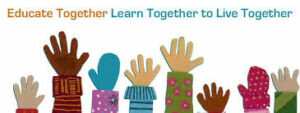Learn Together
In an Educate Together school, a daily period of time is set aside for the ethical education curriculum, which is delivered in addition to the National Curriculum. This program is called the “Learn Together” curriculum and is published by Educate Together. It defines the core values of all teaching and learning in the school. It is subject to continuous review and development.
THE ‘LEARN TOGETHER’ CURRICULUM
The programme is divided into four strands: Moral and Spiritual Development, Justice and Equality, Ethics and the Environment and Belief Systems. The curriculum specifically addresses the Educate Together ethos and it is here that the values that the school seeks to model in its ‘characteristic spirit’ are articulated and explained in greater depth.
MORAL AND SPIRITUAL DEVELOPMENT
The aim is to help children develop a critical knowledge, understanding and awareness of right and wrong. Teachers aim to develop a strong awareness of social, ethical and moral standards through reflecting on the meaning and purpose of life. The strand should encourage and develop the individual on their journey to inner discovery and empower the child to make informed moral choices.
EQUALITY AND JUSTICE
The general aim of the strand is to develop in children a critical knowledge, understanding and awareness of issues relating to human rights, equality, culture and diversity, social justice and social inclusiveness and to empower them to make a difference.
BELIEF SYSTEMS
This strand explains and explores the major belief systems and life stances in the world in an educational manner, teaching children about these faiths and beliefs without endorsing any particular one as religious truth. This strand of the curriculum is usually very important to ensure that children of all backgrounds feel fully part of the school.
Particular care is taken to represent non-theistic, humanist, atheist and personal life stances as equally valid as traditional religions.
During the year, an Educate Together school may mark – in an age appropriate way – festivals such as Chinese New Year, Easter, Hindu festival of lights (Diwali), Harvest Festivals, Samhain (Halloween), Darwin Day, Ramadan and Eid, Hanukkah and Christmas.
ETHICS AND THE ENVIRONMENT
The school develops in children a knowledge, appreciation and respect for their environment to empower them to take an active role in its stewardship. The environment is defined to include concepts of social, economic, political and environmental sustainability.
Children are expected to participate in the study of the environment and social issues in their own community and take appropriate action. This may involve setting up an eco-school committee, visiting the elderly, surveying waste, traffic or water use in the area, setting up mini social enterprises and making representations to the local council or political representatives.
The program allows the school to explore the similarities and differences with the older celebrations that underlie many of these festivals. Examples would be how Celtic festivals and practices underpin the way that Easter is celebrated in Britain or the solstice-based festivals that occur in many religions around the end of the year.

